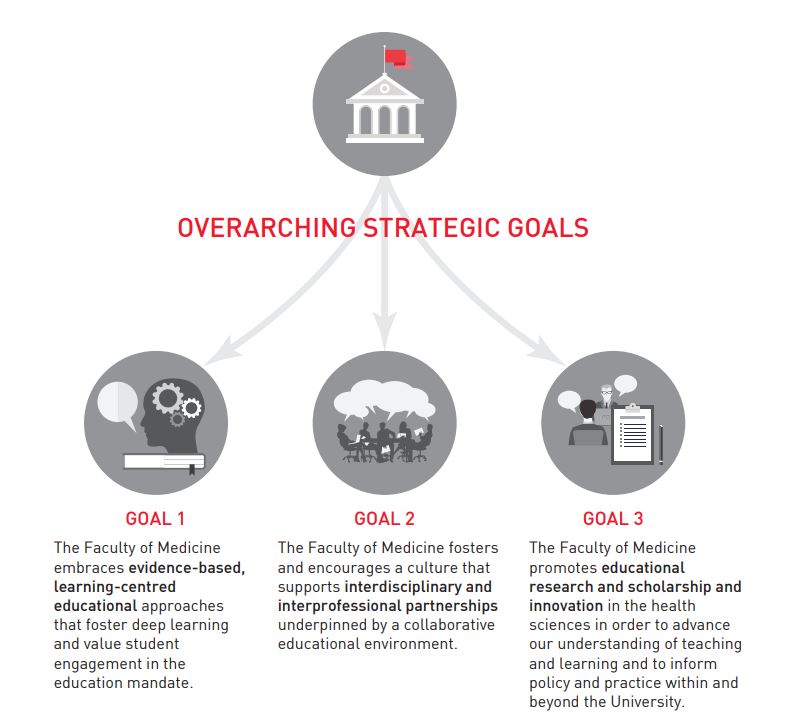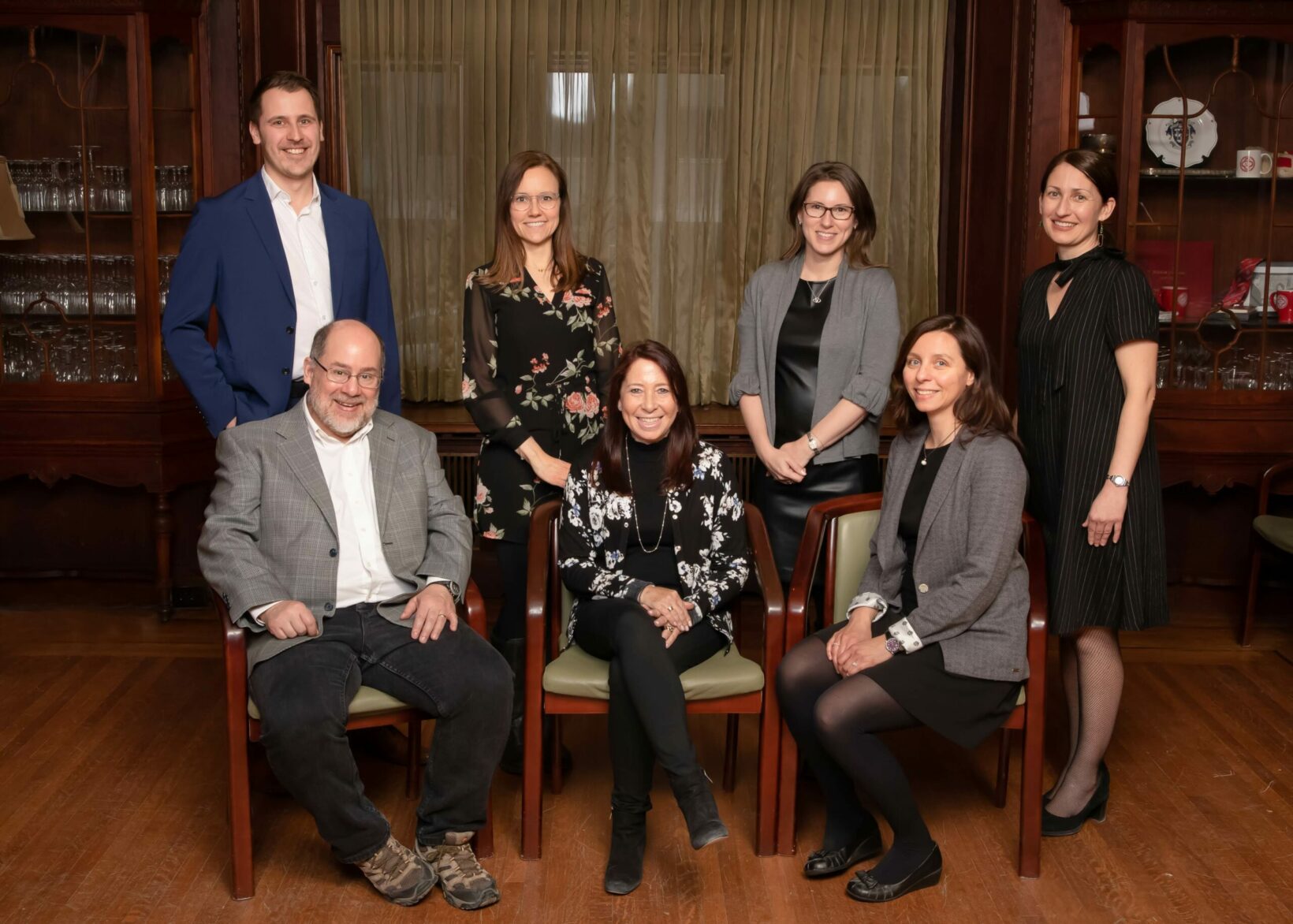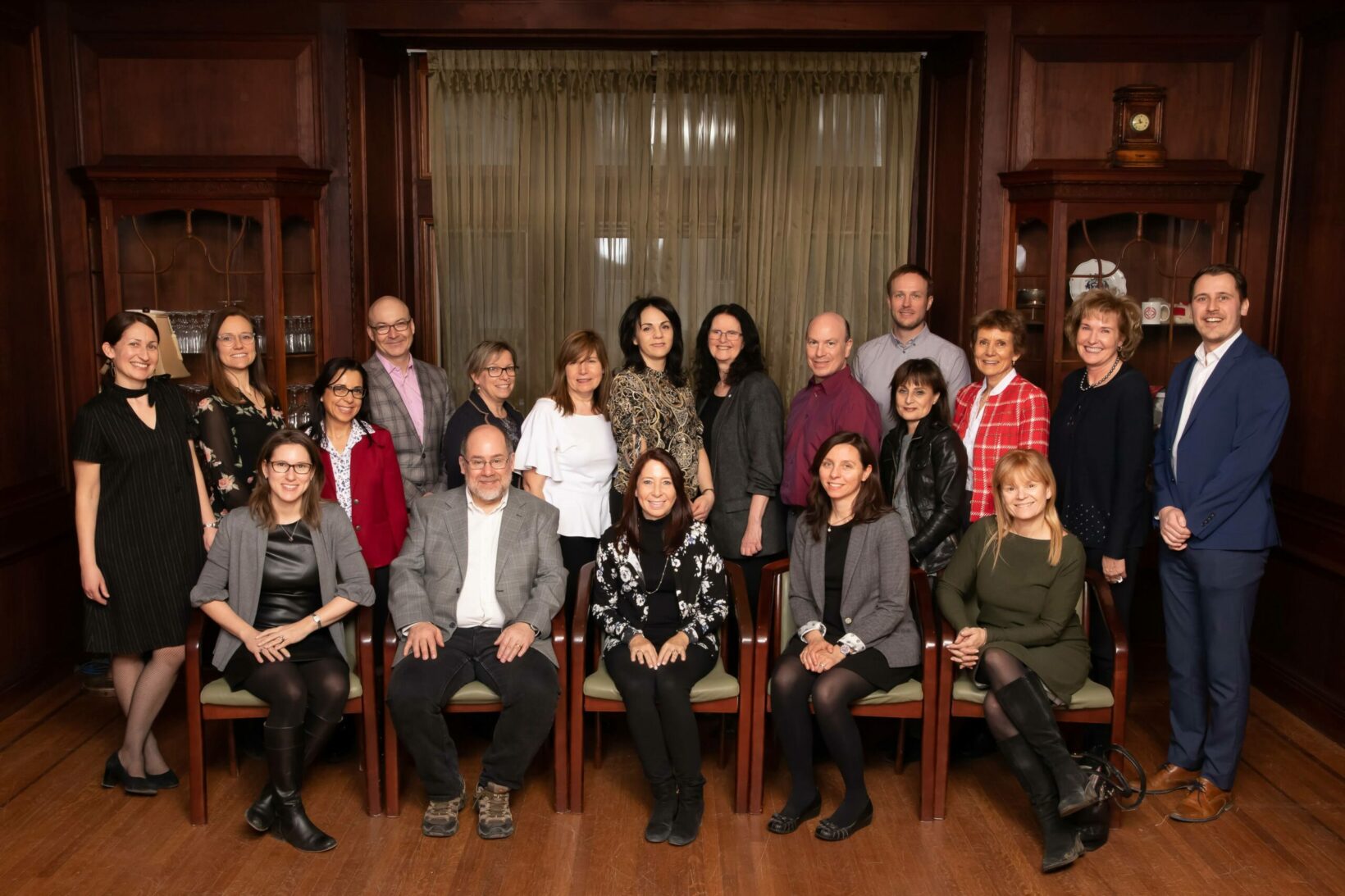
By Matthew Brett
This is part of an ongoing article series to raise the profile of education, teaching and learning in the Faculty of Medicine and to advance the Faculty’s Strategic Education Plan (2017-22).
A growing community of leaders from McGill and its academic health network are transforming the teaching and learning enterprise as part of the Faculty of Medicine’s Strategic Education Plan, which is part of the Faculty-wide Project Renaissance strategic planning initiative.
Leaders of the plan are collecting data on the status of education across the Faculty, and new pilot projects and initiatives are already taking shape.
“This is an exciting undertaking with lots of moving parts that are starting to pay off. We are seeing results,” said Dr. Annette Majnemer, Vice-Dean, Education. “The next three years will be important and we encourage participation from the whole Faculty and our health network to drive this plan forward.”
Here are nine drivers transforming health sciences education at McGill:
- Three goals drive transition
The Strategic Education Plan was developed after a comprehensive iterative and participatory consultation process that helped identify three primary goals for the Faculty:
GOAL 2: the Faculty of Medicine fosters and encourages a culture that supports interdisciplinary and interprofessional partnerships underpinned by a collaborative educational environment.
GOAL 3: the Faculty of Medicine promotes educational research, scholarship and innovation in the health sciences in order to advance our understanding of teaching and learning and to inform policy and practice within and beyond the University.
- Education team facilitates progress
Dr. Majnemer was the first person appointed to the new Vice-Dean, Education, position in 2016 and was recently re-appointed to the role for a second term. A core team works alongside the Vice-Dean including:
– Jessica Emed (Assistant Dean, Health Professions Education)
– Dr. Terry Hébert (Assistant Dean, Biomedical Science Education)
– Dr. Leah Moss (Associate Director, Educational Units)
– Leigh Dickson (Research Assistant)
– Matthew Brett (Communications Administrator)
– Maia Yarymowich (Administrative Coordinator)
- Steering Education Excellence (SEE) Committee promotes educational scholarship:
The Steering Education Excellence Committee provides oversight to the Strategic Education Plan, focusing specifically on educational research, scholarship and innovation.
Its three workgroups are helping transform the education enterprise by:
– Enhancing recognition of teaching and scholarship (“recognition group”): co-chaired by Ms. Emed and Dr. Hébert, this group is identifying ways to ensure that excellence in teaching and other education-related activities are recognized and supported; that education scholarship and innovation are given consideration in the recruitment and promotion of faculty; and that faculty are evaluated comprehensively in teaching performance. These efforts are intended to shift the culture within the Faculty so that education is valued at the same level as research.
– Building capacity and enhancing productivity in educational research (“capacity-building group”): chaired by Dr. Hébert, this group is building on strategies to increase scholarship and skills in educational research by clinicians and educators, as well as ways to enhance partnerships between researchers and educators.
- Education Champions driving change
Education Champions are leaders in education from their respective departments in the biomedical sciences and from the health professions. They will be meeting regularly and are a driving force in implementing the plan in their respective departments, schools and clinical settings.
The Education Champions are working on everything from learner-centred teaching spaces to breaking disciplinary silos and increasing the value of education across the Faculty.
Education Champions in the Biomedical Sciences include Adam Finkelstein, Ahmad Haidar, Arijit Nandi, Claire Trottier, Edith Zorychta, Emily Bell, Geoffroy Noel, Jennifer Fitzpatrick, Lisa Münter, Maxime Denis, Melissa Vollrath, Nicholas King, Nicole Ventura, Veronique Brulé.
In the Health Professions programs, Education Champions include Joanne Alfieri, Nicola Casacalenda, Jeff Chankowsky, Marion Dove and Gillian Bartlett-Esquilant, Sherif Emil, Srinivasan Krishnamurthy, Kevin Lachapelle, Stuart Lubarsky, Lily Nguyen, Joyce Pickering and Ning-Zi Sun, Laurie Plotnick, Francine Wein and Devinder Cheema.
- Education Leadership Council
The council has a mandate to “meet and exchange ideas, to discuss educational issues and challenges that cut across the educational portfolios (e.g., undergraduate, graduate, postgraduate, and continuing professional development), and to promote new educational initiatives in the Faculty of Medicine’s schools and programs.”
The council helped shape key priorities of the Strategic Education Plan and meets regularly. The council consists of learners, Assistant Deans, Associate Deans and Directors from the Faculty’s schools, educational centres and units, as well as education Directors from the McGill Academic Health Network.
- Biomedical Sciences value education
Dr. Hébert is working alongside a team of Education Champions to make teaching and learning a priority in the biomedical sciences.
“We really are trying to make education a core value of what we do,” Dr. Hébert said. “This really is all about learners at the end of the day.”
Education Champions in the biomedical sciences are working together across disciplines to establish goals to work toward. A survey has also been circulated to identify strengths and needs across the biomedical sciences to help chart a path forward.
Because learner-centred education is a core pillar of the Strategic Education Plan, Dr. Hébert is also working with undergraduate students to potentially form an interdisciplinary student group that will strengthen student representation and engagement in the biomedical sciences.
- Health Professions education is mobilizing
Ms. Emed is building relations across Teaching and Learning Services, the Faculty Development Office, the Office for Interprofessional Education, clinical partners, and she will also be working closely with the Alliance for Professional Programs. The Health Professions Education Champions met late this April.
“There is lots of amazing work already taking place that aligns with the Strategic Education Plan, so part of our work is to identify and promote this while seeking to foster new collaborations and initiatives,” said Ms. Emed. “It’s a big undertaking but there is genuine excitement about raising the profile of teaching across the Faculty.”
- Institute of Health Sciences Education approved!
A major accomplishment for the Faculty that aligns with the Strategic Education Plan, the new Institute of Health Sciences Education formally launched on May 1, 2019.
The Institute, which replaces the existing Centre for Medical Education, is an academic hiring and teaching unit that can provide an academic home to faculty members and graduate programs in health sciences education.
“We have been going from strength to strength in recent years, and becoming an Institute opens the door to many new opportunities,” said Dr. Yvonne Steinert, Director of the new Institute. “We are very excited to harness this momentum and steer it in a new direction.”
The Institute and its work aligns with Goal 3 of the Strategic Education Plan to promote “educational research, scholarship and innovation in the health sciences in order to advance our understanding of teaching and learning and to inform policy and practice within and beyond the University.”
The Institute’s new designation will stimulate research and scholarship in an interprofessional setting, moving beyond traditional departmental lines and disciplinary boundaries in order to create new knowledge, enable capacity-building and promote knowledge translation.
- Learning Environment Action Panel
The McGill Faculty of Medicine has outlined next steps to improve the clinical learning environment for health professions trainees following a retreat in 2018 and the Learning Environment Action Panel is playing a key role in driving this forward.
The goal is to foster a safe, supportive and stimulating learning environment that promotes learner vitality and recognizes excellence in teaching. This is closely aligned with Goal 1 of the Strategic Education Plan to embrace “evidence-based, learning-centred educational approaches.”
May 9, 2019



